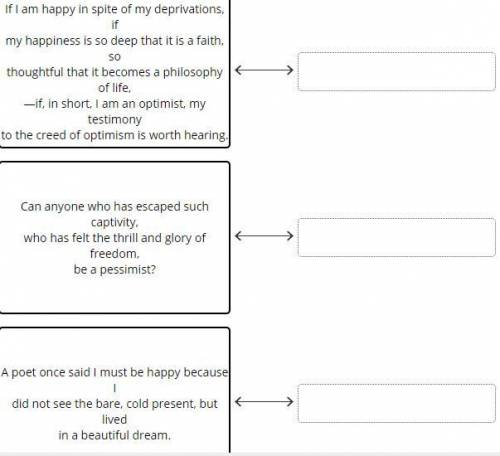From Optimism Within
by Helen Keller
Could we choose our environment, and were des...

English, 10.04.2020 20:16, Daddysgirl2019
From Optimism Within
by Helen Keller
Could we choose our environment, and were desire in human undertakings synonymous with endowment, all men would, I suppose, be optimists. Certainly most of us regard happiness as the proper end of all earthly enterprise. The will to be happy animates alike the philosopher, the prince and the chimney sweep. No matter how dull, or how mean, or how wise a man is, he feels that happiness is his indisputable right.
It is curious to observe what different ideals of happiness people cherish, and in what singular places they look for this wellspring of their life. Many look for it in the hoarding of riches, some in the pride of power, and others in the achievements of art and literature; a few seek it in the exploration of their own minds, or in the search for knowledge.
Most people measure their happiness in terms of physical pleasure and material possession. Could they win some visible goal which they have set on the horizon, how happy they would be! Lacking this gift or that circumstance, they would be miserable. If happiness is to be so measured, I who cannot hear or see have every reason to sit in a corner with folded hands and weep. If I am happy in spite of my deprivations, if my happiness is so deep that it is a faith, so thoughtful that it becomes a philosophy of life,—if, in short, I am an optimist, my testimony to the creed of optimism is worth hearing. . . .
Once I knew the depth where no hope was, and darkness lay on the face of all things. Then love came and set my soul free. Once I knew only darkness and stillness. Now I know hope and joy. Once I fretted and beat myself against the wall that shut me in. Now I rejoice in the consciousness that I can think, act and attain heaven. My life was without past or future; death, the pessimist would say, "a consummation devoutly to be wished." But a little word from the fingers of another fell into my hand that clutched at emptiness, and my heart leaped to the rapture of living. Night fled before the day of thought, and love and joy and hope came up in a passion of obedience to knowledge. Can anyone who has escaped such captivity, who has felt the thrill and glory of freedom, be a pessimist?
My early experience was thus a leap from bad to good. If I tried, I could not check the momentum of my first leap out of the dark; to move breast forward is a habit learned suddenly at that first moment of release and rush into the light. With the first word I used intelligently, I learned to live, to think, to hope. Darkness cannot shut me in again. I have had a glimpse of the shore, and can now live by the hope of reaching it.
So my optimism is no mild and unreasoning satisfaction. A poet once said I must be happy because I did not see the bare, cold present, but lived in a beautiful dream. I do live in a beautiful dream; but that dream is the actual, the present,—not cold, but warm; not bare, but furnished with a thousand blessings. The very evil which the poet supposed would be a cruel disillusionment is necessary to the fullest knowledge of joy. Only by contact with evil could I have learned to feel by contrast the beauty of truth and love and goodness.
Drag the tiles to the boxes to form correct pairs.
What is the purpose of each of the following statements? Match the purpose with the correct statement from the text.



Answers: 2
Other questions on the subject: English



English, 22.06.2019 02:00, chloerodgers56
Identify the following sentence as simple, compound, complex, or compound-complex. even though most people think of africa as a desert, zimbabwe has a hot, tropical climate, so mangoes, passion fruit, pineapples, and avocados grow well there. a. compound b. simple c. complex d. compound-complex
Answers: 2

English, 22.06.2019 04:10, teamzomaxx6584
In 250 words, discuss the ways in which the novel relates to the historical context in which it was published.
Answers: 1
Do you know the correct answer?
Questions in other subjects:

Mathematics, 06.05.2021 19:10






Biology, 06.05.2021 19:10


Arts, 06.05.2021 19:10

Geography, 06.05.2021 19:10






